Subscribe Apple | Google | Spotify | Stitcher | iHeart Living the Dream Overseas with Christine Gritmon Have you had a lifelong dream to live overseas and haven't made that happen yet? Maybe things have gotten in the way like family, jobs, life. My...
Ep113 Transcript – Interview with Stephanie and Ethan Bull
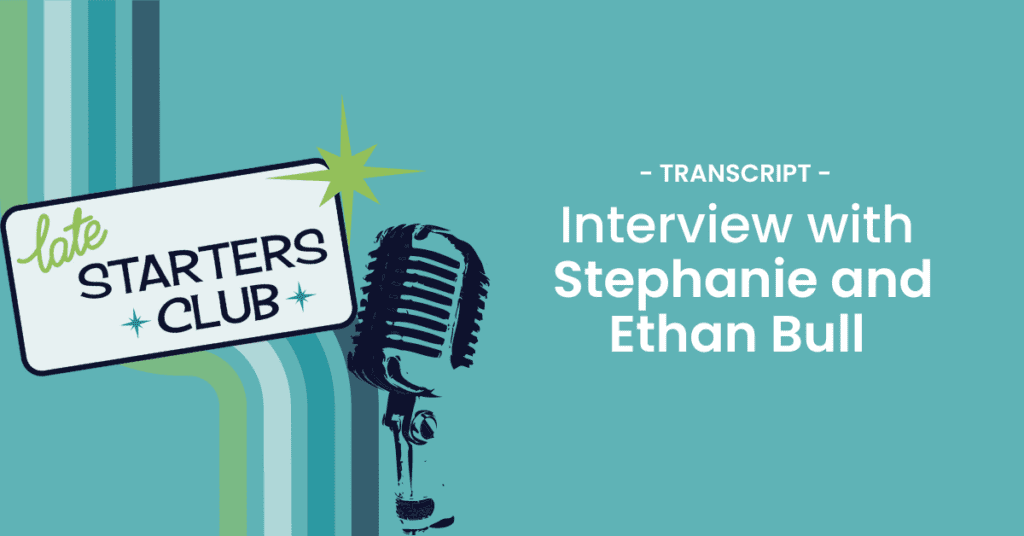
Andrea Vahl: So you’ve just been laid off from your job. You’ve got a wife and kid at home, and you’re in a new city. Does the thought occur to you to start a brand new business with your wife? Maybe not, but it’s just the risk that Ethan and Stephanie Bull took in starting their pro assisting remote assistance business. Listen in to today’s interview and learn about what it took to get them started and what it’s like to work together as a married couple.
Hello Dreamers. Welcome to the Late Starters Club, giving you the inspiration mindset and tools you need to start something midlife and beyond. Remember, it’s never too late to follow your dreams.
Hello everyone and welcome to the Late Starters Club podcast. I’m your host, Andrea Vahl. I am here with Stephanie and Ethan Bull. I am excited because I am just starting to get to know them. We were introduced through a past guest and really excited to connect and hear your story. Stephanie and Ethan, welcome.
Stephanie Bull: Thank you.
Ethan Bull: Thanks for having us.
Andrea Vahl: Yeah, so a little bit about Stephanie Ethan. They are they’ve, they have started pro assisting, which is a virtual. Executive assistants, right? Is there, or do you have virtual and remote?
Ethan Bull: We consider remote virtual. And we feel that there’s a difference between a virtual assistant and a remote executive assistant.
But we agree with you that. It can be interpreted many different ways.
Andrea Vahl: And actually I was just, I think that’s what I was doing. I was diving into that FAQ on your site, on what was the difference between virtual and remote, and I thought that was really interesting. But full service, professional executive assistants is basically the core offering there.
And you guys have an amazing background. Stephanie was the former executive assistant for J. Cruz, CEO and CEOs of two multi-billion dollar hedge funds, and Ethan has had a background in hospitality and expert in the executive assistant space and just lots of senior positions out there. And I think it’s so amazing that you both partnered together.
As partners and launched this business five years ago. So why don’t you just walk us through a little bit of how that came about and how what was the impetus for starting this and starting this together?
Ethan Bull: You want to go?
Stephanie Bull: No, go ahead. Go ahead.
Ethan Bull: Thanks again for having us. Frankly, we were serving in those roles and what you mentioned at a very high level, living in New York City.
I was there 20 years, Steph was there almost 15. And then our second son was coming along in the oven, would you say?
Stephanie Bull: I was pregnant.
Ethan Bull: In the oven and we were like, we’re going to sell our condo, quit our jobs, ditch our healthcare, and move six hours north of the city where I’m from in Canandaigua, New York, it’s one of the Finger Lakes. And when we landed here, we quickly realized that the term executive assistant means something in this kind of smaller market area. And when I was off working at Rochester Regional Health in one of the few seats that was aligned with what we do and our compensation and our seniority.
Stephanie was at home wrangling the kids.
Stephanie Bull: I had never been a stay at home mom. And all of a sudden I was like okay. I am not working. This part of my identity is no longer here so do you want to go?
Ethan Bull: Yeah, sure. And then a friend of ours reached out to Stephanie. And she said, look, I know this Fortune 100 consultant, she needs a great assistant, which Stephanie is an amazing assistant, doesn’t need full-time and doesn’t care where you live. And that was in 2017 and that’s when we started doing a deep dive on the virtual assistant space. And frankly it didn’t align with what we do or our level of experience.
And so we saw this gap between where those virtual assistant services drop off in a right full-time assistant picks up. And so that’s where we put pro assisting.
Andrea Vahl: Yeah, that is awesome. And I love that because, I think for sure there’s a need for that, like a real high level, but fractional, like you have, but you have fractional and possibly full-time, right?
You have a gamut of that, Is that correct?
Stephanie Bull: We have a couple of clients that we serve at almost a full level, but the majority of our clients take, we call them resources, we don’t go at hours, usually it’s each assistant has three clients, so a third of the assistance.
Andrea Vahl: That’s, you see a gap in the market, you see a need and you’ve got that expertise, you’ve got that, knowledge and visibility as an expert in the field. And it’s exciting to say, yeah, we’re going to. We’re going to launch this.
So that’s amazing. So walk me through some of the early times with launching this together. What was that, like? How did you take the leap between…?
Ethan Bull: I would start by saying, I called Stephanie and said I was let go. And decided what to basically bet my severance package on, investing our own money into the business and we were going to make it work, come heck or high water.
Stephanie Bull: And it was, I will say just from the emotional, it was it was one of the most challenging times and in our relationship. Doing this all of a sudden no job, we have, we do have some money in the bank, but it’s it felt like a clock to me.
And Ethan is much more of the visionary in our relationship, and I’m more of the governor, like the more practical one. So we compliment each other. But there were times when it was really scary. I remember being in my car and blasting music and crying, on a few occasions.
But now, no regrets.
Ethan Bull: I kept telling her it was going to work. And then I’d go in the bathroom and say, Is this Really?
Stephanie Bull: And we had the young kids, so it was an adventure.
Andrea Vahl: So you’ve got all the challenges of finding time to launch this business with the young kids, being married, just so how would you navigate, like turning those discussions on and off? Did it just bleed into everything? Was that hard to set some boundaries around work versus, home or date night or whatever?
Stephanie Bull: I think it’s something that we have gotten better at. I think actually, over our communication, because we work together and run a business together our communication has just improved so much. And, even at the personal level. I feel like we’re both more, I don’t know, I’m more just honest about what I’m thinking and feeling and I think Ethan’s the same.
Ethan Bull: I think we’ve gotten really good at switching contexts very quickly. Sometimes I’ll get going on a rant or an idea, and then she’ll just say, we’re on a date night, can we just not go there? And then other times we solve big problems on a date night. And it does. It doesn’t matter. And I guess that can go back to the nature of assistant work.
When you’re at a really high level, you need to be able to shift contexts very quickly. And if you are going to have some sort of a personal life when you are working 24/7 for a principal, you need to be able to get mentally in and then out of what you’re doing. And so I think that kind of translates a little.
Stephanie Bull: Yeah, no I totally agree.
And it’s one thing about running the business is that people think, “oh, you work for yourself, you must have it made.” No, it never turns off. I feel very grateful and blessed that I get to greet my kids off the bus every afternoon, which so many people can’t say, but at the same time, I could easily be working at, 10 o’clock on a Sunday night or we get a call from a client or assistant that is of an urgent matter and that has to be dealt with. It ebbs and flows.
Andrea Vahl: I, yeah, I can imagine. It just, there’s so many benefits to working for yourself, but yeah, that definitely it is it is a extra challenge as well. So what would you guys say, you’ve had so much experience you’ve been out in the corporate world. What has been some of the benefits with starting something, in your midlife as far as the experiences you’ve had or things that you’ve, lessons you’ve learned with it? What has been helpful about getting started later?
Ethan Bull: I would say that the experience informed our decision in terms of the business we decided to create and the business model that we decided to leverage. It wasn’t like we put a dartboard on the wall and threw a dart and said, let’s start a business and see where this dart ends up. We leveraged our corporate career experience, which is over 40 years combined into a service that we’ve tried to productize and make accessible and provide value to our partner assistants and provide value to our clients and to pro assisting. And we really feel we’ve hit on that magic trifecta that, that kind of sets us apart.
Andrea Vahl: That’s awesome. That is great. I think it’s, I think starting, I think it’s just way better to start something when you’re older. I think you’re just more you’re also more, even emotionally, even though, because it is still a rollercoaster, right? I am. I’ve definitely been the cry in my car kind of times as well.
But, like it, it feels like it’s going to be okay. We’re going to, we’re going to get through it.
Stephanie Bull: Exactly, we have the benefit of perspective.
Andrea Vahl: Yes. Exactly. Exactly. And was there ever, as you were starting this up, was there ever this like feeling of total overwhelm, like this isn’t working, or this isn’t happening the way we thought, or, what have you done to get through some of that really big overwhelmed challenges and times.
Ethan Bull: I, I’ve listened to my wife. She is very good at saying, look, we’ll lose a client. Especially in the beginning when that really mattered. From a monthly cashflow perspective, it was we’ll find another. I think going back even to the previous question it was…
We built our business to basically fill ourselves up with clients. And then just keep going. With other executive assistants who we felt had what it took to do what we do. And there is an inherent distribution of clients that allows for us to have some security in the fact that we may lose as a client, but we’ll gain two and we may lose two and we’ll gain one, and then we gain another three. And then it’s just the nature of the beast.
There’s this awesome book by Arthur Brooks called From Strength to Strength, and I think it really relates to this discussion.
And he talks about how you have the ability to leverage that first half of your career in your twenties and thirties and into your early forties, into a second act, if you will, that leverages all of that experience and converts it into you being able to pick what you, the best parts of that you like and turning it into a viable business, whether that’s a consultancy or coaching or or even doing what you do fractionally for clients instead of company. And Covid really brought this to bear was that geography is getting somewhat irrelevant.
Stephanie Bull: That’s the perfect segue, because I was just going to say I remember the initial sales calls, in 2018 with potential clients and trying to explain that you could have an assistant, an executive assistant that was not right outside your door.
And that was, for some people, that was just like, whoa, I don’t know. I don’t know if that will work. And then bam, sadly, COVID happened and all of a sudden it was, it made perfect sense. Yeah, so that was a, one of the, I think, hurdles in the beginning. Hopefully was surmountable. But…yeah.
Andrea Vahl: So everyone totally understands that now we can all be remote. It’s totally fine.
Stephanie Bull: Exactly. Unfortunately we lived it, so we understand now.
Andrea Vahl: Yeah, so that’s definitely interesting. And I think there’s, I think with the economy there’s probably some benefit to you guys as well, like where people say, you know what, I actually probably don’t need someone full-time and we can, get a little cost savings that way just by having someone fractional or whatever.
So that’s probably a benefit as well. Good. So let me just, I was, yeah What, so you guys, the, you guys had the had the fund or the severance package and were able to make that work and did, was everything pretty, pretty good from the beginning? Were you able to ramp up to where you were hoping to be pretty quickly or what was that first starting part like?
Ethan Bull: We’re fortunate in that we’re pretty diligent about staying on top of our personal finances and having a safety net. And that is something we teach or speak to and coach our remote executive assistant partners on. Even before they’re coming on board. Just to be prepared for the ebbs and flow of starting a business.
But we had a leg up in that, both Stephanie and I, she’s the better assistant, bar none, but we both have that experience, so it was adding clients to our plate Initially, which was an easier conversation than let me partner you with someone who we’ve partnered with. And then, but I’m not going to shy away from the fact that there were ups and downs.
There’s always ups and downs in the business, and that’s what Stephanie’s really good at. Keeping an eye on the horizon, and we’re doing the right thing. Clients have been with us longer than five years at this point. And if we’re serving those clients like that and they’re staying with us that long, there has to be others out there.
And I think that’s one of the reasons we want to have these conversations with people like you and your audience just to let people know that there is a real option other than a virtual assistant, which is a little bit different of a breed than we are. That really does provide that high level support that we do on a daily Monday through Friday, nine to five basis.
Andrea Vahl: That’s great. And I think that’s great that there’s, you’ve got the both sides of that coin. Like it’s people that who are doing the work for you as. Executive assistants, but then also getting connected with those people who need those services. And so that’s really great.
And I think it’s huge. That is great information for anyone starting a business is just having that cushion and having that really that really discerning eye on your finances. because I think it’s, that’s a huge thing I didn’t expect either. Just, you all of a sudden you get used to this level of client work and then, some, something happens and it’s woo, we got to make sure we’re paying the bills this month. So…
Stephanie Bull: I said actually just the other day remember when I would say, if worse comes to worse, I can just go back to work for someone else.
Like that would be the worst case scenario. But no, you’re absolutely right when you’re used to being an employee and having more of that stability it’s something that you have to adjust to, right?
Andrea Vahl: Exactly. There’s still occasions where I’m like, “That’s it. I’m going to go on LinkedIn, look for a job.” I’ve been working for myself for 14 years now, and I still every once in a while.
Ethan Bull: It doesn’t go away. It really doesn’t and that is the one thing that I was not aware of when I was working full-time for an employer was that the grass always looked greener.
Ooh, they’re running their own business. Oh man. Wouldn’t it be amazing to do that? Listen, it is amazing. But the inherent stress that even when things are well, you can still say to yourself “That’s it. I’m just going to go to LinkedIn and find a job.” And I didn’t think that, I didn’t foresee that.
Andrea Vahl: No. It is funny. And it is funny that it doesn’t go away, the funny thing is too, is that even once I get over there and I’m like, what am I doing? This is, I can’t, I’m unemployable at this point.
Ethan Bull: Yeah, we use that word as well.
Andrea Vahl: I know. So that, that is great. That is great. So I want to get into this a little bit about what your people do, what they can do for your clients. And talk a little bit about that. How you help, basically how you help your clients.
Ethan Bull: We really look at a great executive assistant as being a chameleon. They are really industry agnostic as well as principle agnostic. If they’re going into an industry that they’re not familiar with, they’re going to get smart on it really quickly.
And they’re going to meet their principles, their clients, where their client is. In terms of where’s the need, is the calendar triple booked all over the place? Is the email inbox got 50,000 unread emails? Are they losing track of to-do lists items that they need to do? Is there nobody that any of their direct reports can go to, to get a quick answer as opposed to getting bogged down with all of those requests? So it’s really about meeting them where they are.
In a general sense, we use the five pillars that we outlined in our book, which are being a business partner, a chief of staff, a project manager, an assistant/scheduler, and a personal assistant. So anything we can do to take something off of a client’s plate, keep something from getting on that plate, being that single point of contact and handling those tasks that are repeatable, that need to get done by someone, and the CEO can find themselves doing it. And then you’re like, why am I doing this?
Does that answer the question?
Andrea Vahl: Yes! And we didn’t even mention your book. It is the 29-Hour Workday, which to me sounded horrible, but I love the tagline. The high performers guide to leveraging your EA or executive assistants assistant.
And so I love that idea too. Or just the whole idea of just getting so much more done in a day and all of that. So yeah, it’s like the opposite of the four hour work week.
Stephanie Bull: Yes.
Ethan Bull: That was the thought process. Behind picking that title, which happened really quickly in about at 45 minutes. Our five performance multipliers give you back five hours in your day. That’s to make it non-scary.
Andrea Vahl: That’s great. That’s great. So did you write the book together? It looks like it’s just did you what was that process like writing a book together?
Stephanie Bull: Funny that you ask. So we we leveraged a publishing company called Scribe Media. And so we worked with a scribe. She was she really was our shepherd through the process and we actually did 10, two-hour interviews over the span of 10 weeks. Talk about a lot of together time.
Ethan Bull: It was couples therapy wrapped in it one.
Stephanie Bull: It was so funny. It was like the Newly Wed game, like these questions, and you’re like, wow, I never knew that about you and… It was a great process.
Ethan Bull: I actually do write I’ve written about 12 screenplays and published a graphic novel, and I know how hard the process is.
And so the idea of leveraging a referee, if you will a guide who would pull this out of us was enticing and we have nothing but good things to say about the process and the company and how everything was handled. We would totally use them again if we wanted to put ourselves through that. But not in the near term. That’s how we got it done.
I don’t think we would’ve gotten it done if we were running the business and writing it ourselves straight up. And going through the whole process. It just would’ve been, it wouldn’t have been possible.
Andrea Vahl: Yeah, that’s, that’s awesome. And congratulations on that. That’s a feat in itself. I know how that can go and I can’t imagine having to work together on that is also a wonderful feat and probably…
Stephanie Bull: Yes. Thank you.
Andrea Vahl: When I was, when we were co-authoring the Facebook Marketing All In One For Dummies book, we each just had chapters by ourselves. So that was actually a little bit easier in a certain way.
So talk about how you divide up the work that you are having to do. Are there clear kind of roles, boundaries? Do you run through adjustments as you learn to work together?
Stephanie Bull: Yes. I think that Ethan focuses more on the sales side of the business which is great. He’s very talented at that. And I focus more on the operations of the business and then also focus on the more the family stuff.
So that’s…
Ethan Bull: Keeping everything alive in the house.
Stephanie Bull: Yes. That’s something I…it’s the unpaid work, but just as important or if not more important than business. But that took some time for us to arrive at a good working balance. And it’s again, it goes back to communicating and always being ready reevaluate that.
Ethan Bull: And we don’t really differentiate between personal and work is, it’s such a gray line and we both still have clients directly. So it’s not like we aren’t walking the walk. Yeah, we do have clients.
I’ve been with my clients for five years and you’re going on three or four with yours. And obviously our goal is to dissipate that as time goes by. But in terms of having the bird’s eye view of what it’s like to directly assist billionaires. Stephanie is bar none, the best assistant I’ve ever seen in that role. And that experience is so invaluable to what we do and how we work through problems because it’s a person to person business. You don’t run a person to person business without problems. And she definitely wears the CEO hat. And I handle more of the sales conversations and we’re really excited right now that we’re launching a new side of the business, which is a training program for executive assistants.
And a lot of it is about showing them how to position themselves and prepare themselves. To make that second half of their career transition to working for clients instead of bosses or levering up on their current role and how to do that. And what’s really interesting is that both Stephanie and I have deep experience on the corporate side.
And now we have deep experience on the entrepreneurial side, if you will. And so we’re hoping that, nope, we’re confident that’s going to go really well.
Andrea Vahl: That’s great. I know sometimes I always, words are important, right? To our that into universe. Yes, for sure. Our mindset, universe, all of that.
It’s amazing how that can change and how much mindset helps with all of this. So that’s great. It’s been so fun talking to you and get to getting to know you guys and hearing your story. And what I’d love to have you share with us is just what your favorite quote or inspirational saying that keeps you guys going.
Stephanie Bull: My favorite quote is one by Maya Angelou. And I’m paraphrasing. It’s people will forget what you said. They will forget what you did, but they will never forget the way you made them feel. And we definitely consider ourselves we’re executive assistants, but we’re really in the hospitality industry, and taking good care of our clients and our assistance is it’s what, keeps us going every day.
Ethan Bull: Providing a service, but being able to raise it to the level of hospitality. And that quote goes to the heart of that.
Andrea Vahl: That’s awesome. I love it. Yeah, for sure.
It’s definitely so true and especially you realize that as you get to midlife and beyond and you can’t remember as many things.
So let us know where can people find you? I know we’ll have things in the show notes with links to your book and your website, but just let our listeners know where they can connect with you a little bit more.
Ethan Bull: Sure. Our website is proassisting.com. And we’re both active on LinkedIn.
Ethan Bull. B u L and Stephanie Bull. And you can connect with us there. We’re also on some other social platforms, but those are probably the best ways to reach us and the website to learn more about us.
Andrea Vahl: Awesome. Awesome. Thank you Ethan and Stephanie for being on with us today and sharing your wisdom and your journey with our listeners and being inspiring part of people’s day.
So thank you so much.
Ethan Bull: Thanks for having us.
Andrea Vahl: Hope that was helpful, and make sure you grab the free guide Top Tools for Late Starters on the website at latestartersclub.com and let’s turn dreaming into doing.
Join the conversation.
Let us know what you think about this episode.
Never miss an episode.
Subscribe to the podcast
You may also enjoy…
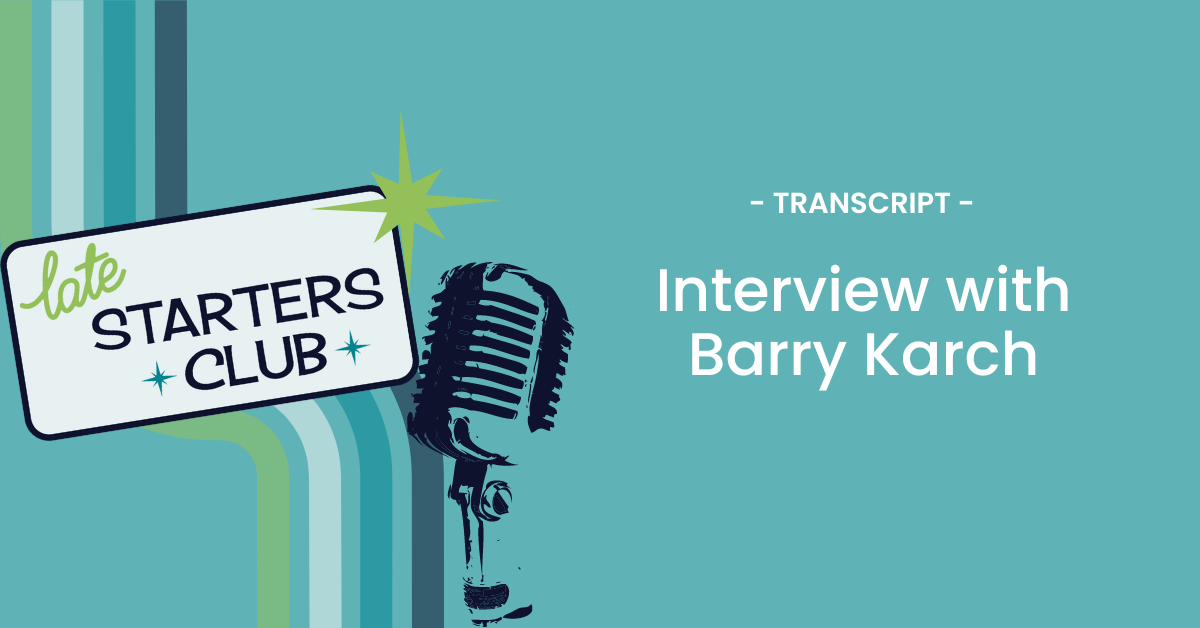
Ep170 Transcript: Finding New Motivation with Barry Karch
Finding New Motivation with Barry Karch Andrea Vahl: It's never too late to restart something you loved. My guest today, Barry Karch, started training for a marathon after a 20 year hiatus. And we'll also dive into how he climbed the equivalent of Mount Everest...
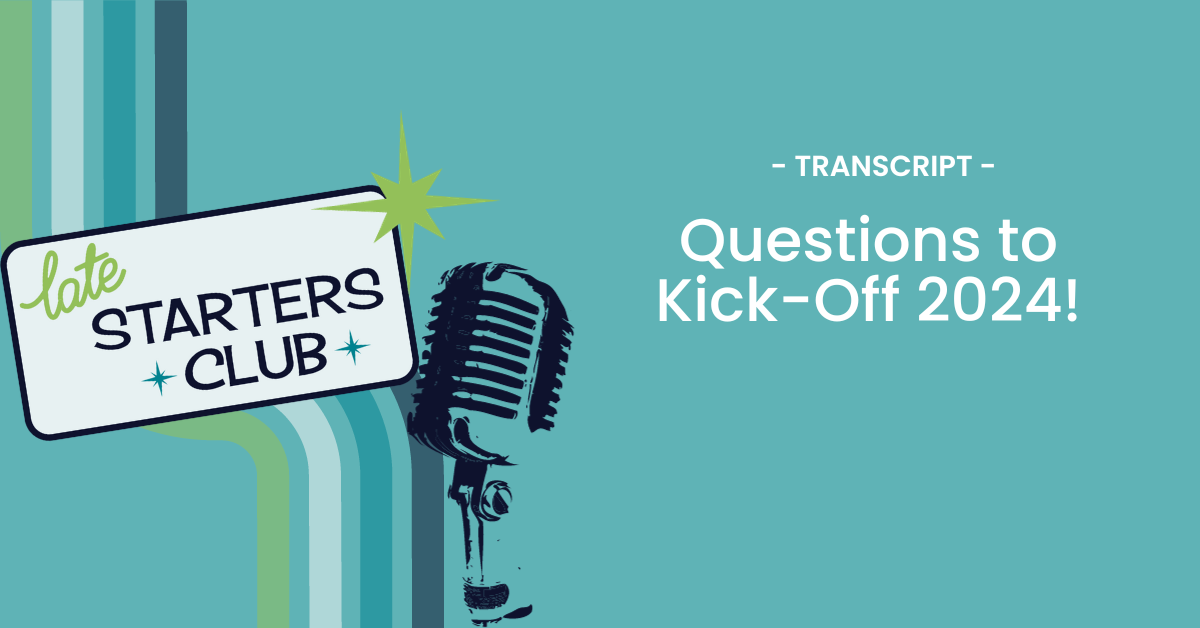
Ep169 Transcript: Questions to Kick Start 2024
Andrea Vahl: Oh, happy new year. Yeehaw. 2024. All right. I don't know about you, but I love planning out my year and setting goals and really reflecting on how my past year went and being super intentional about what I want the next year to look like. In today's...
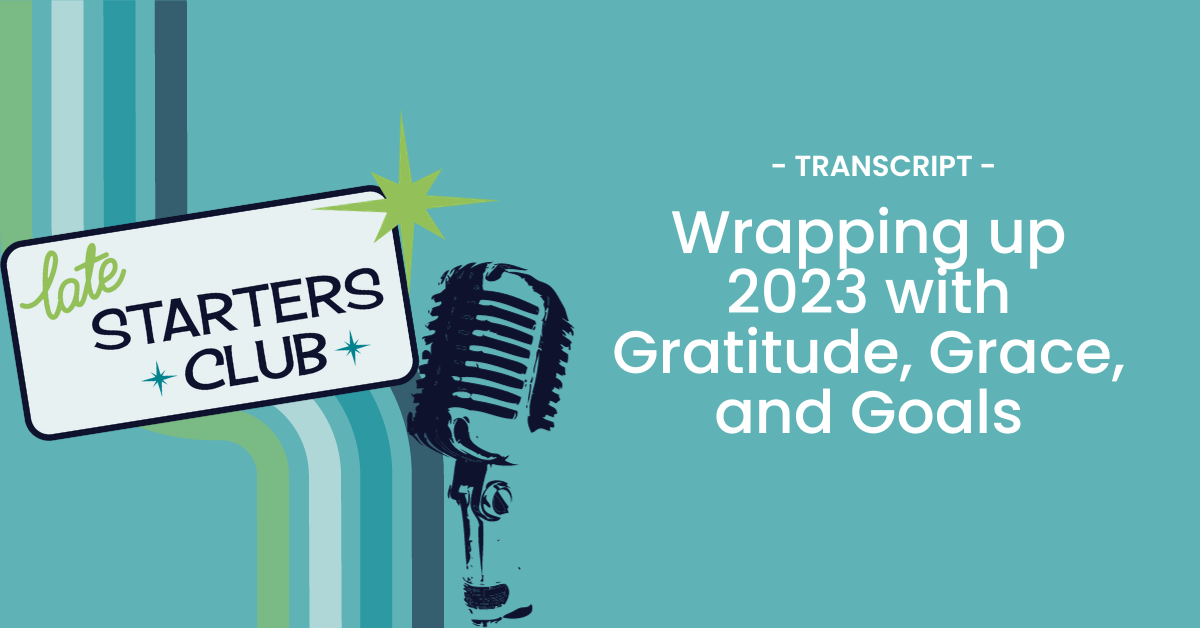
Ep168 Transcript: Wrapping up 2023 with Gratitude, Grace, and Goals
Hello, late starters. It's your host, Andrea Vahl And today is Christmas day. And if you do celebrate that Merry Christmas, if you celebrate some other holiday, I wish you all the best and all the joy for that. I just wanted to make a different episode. So today we're...
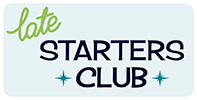
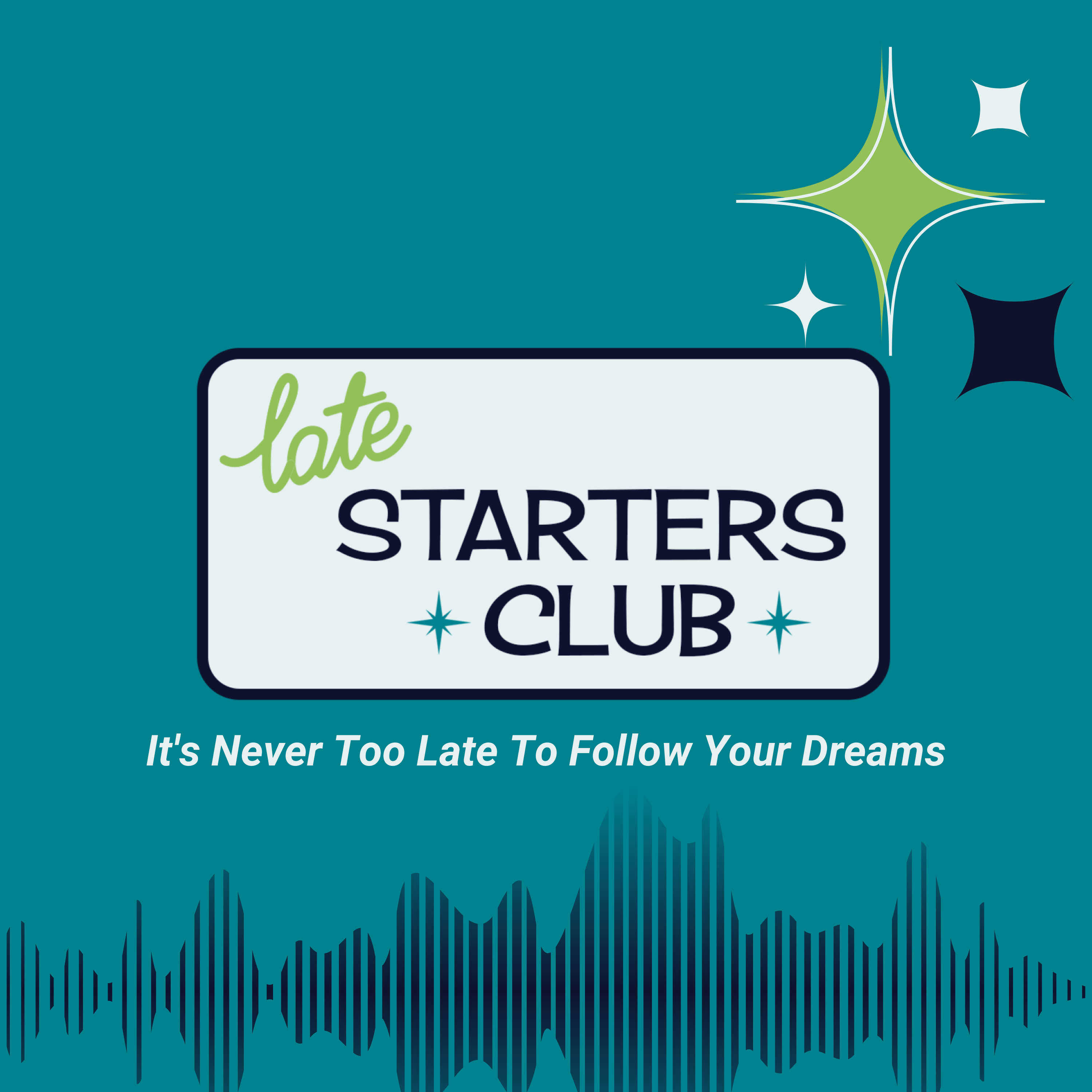
0 Comments